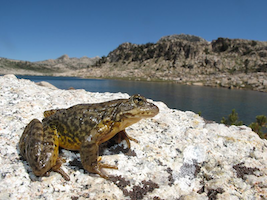As ZeroHedge points out that California is known for its wacky legislation. But this one is incredible (not quite as incredible as trying to stop cows from breaking wind, but it’s up there). In this latest eco-power grab, the state has set aside nearly 2 million acres in order to protect a frog, the Sierra Nevada yellow-legged frog to be exact.
Now, this frog is “under threat of extinction” according to the “experts.” And as you read through this article you might think it’s all we humans’ fault. But you should know that the “experts” say that there has been a range-wide reduction in abundance and geographic extent of surviving populations of frogs following decades of fish stocking, habitat fragmentation, and most recently a disease epidemic.

The California Farm Bureau and two ranchers’ associations sued the U.S. Fish and Wildlife Service on Monday, challenging a year-old decision to designate more than 1.8 million acres of rural California as “critical habitat” for three species of frogs and toads that are protected by the Endangered Species Act.
Loggers and ranchers who harvest timber or graze cattle on public lands worry the new restrictions on land use will eventually make it more difficult – if not impossible – to make a living in the Sierra, said Shaun Crook, a Tuolumne County cattle rancher whose family also owns a logging company.
“It has the economic impact of putting you out of business is what that reality could be,” said Crook, president of the Tuolumne County Farm Bureau.
As local ranchers note, the “critical habitat” designation forces farmers and ranchers to pay for environmental studies. The lawsuit filed in U.S. District Court in Washington, D.C. claims the ranchers will be subject to: “to substantial regulatory burdens that impose, among other things, study costs, risk assessments, mitigation fees, operational changes, permit fees, and consulting expenses.” These studies cost a great deal and render the land useless. And “In some cases, these burdens put the rancher’s livelihood at risk.” The worry too, is that the restrictions will suffer from mission creep and expand from public to private land.
The farm groups are represented by the Pacific Legal Foundation, a Sacramento nonprofit that fights for conservative and property-rights causes.
Jenny Loda, an attorney for the Center for Biological Diversity described the farmer and rancher effort to protect their livelihood as nothing more than a “mean-spirited attack against these really vulnerable frogs” blaming climate change and drought as well as the ranchers’ actions for the predicament of the frogs.
Will this turn into another Bundy Ranch style standoff? Watch this space.
